| S1144 |
Ivacaftor (VX-770)
|
Ivacaftor (VX-770) is a selective potentiator of CFTR targeting G551D-CFTR and F508del-CFTR with EC50 of 100 nM and 25 nM in fisher rat thyroid cells, respectively.
|
-
Nucleic Acids Res, 2025, 53(13)gkaf675
-
Cell Mol Life Sci, 2025, 82(1):109
-
JCI Insight, 2025, 10(9)e191098
|
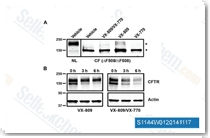
|
| S1565 |
Lumacaftor (VX-809)
|
Lumacaftor (VX-809, VRT 826809) acts to correct CFTR mutations common in cystic fibrosis by increasing mutant CFTR (F508del-CFTR) maturation, with an EC50 of 0.1 μM in fisher rat thyroid cells. This compound is in Phase 3.
|
-
Nucleic Acids Res, 2025, 53(13)gkaf675
-
Br J Pharmacol, 2025, 10.1111/bph.70176
-
iScience, 2025, 28(3):111942
|
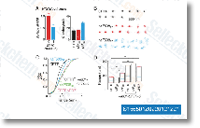
|
| S7059 |
Tezacaftor (VX-661)
|
Tezacaftor (VX-661) is a second F508del CFTR corrector and is believed to help CFTR protein reach the cell surface. Phase 2.
|
-
Nucleic Acids Res, 2025, 53(13)gkaf675
-
Mol Ther Nucleic Acids, 2025, 36(4):102756
-
Cell Mol Life Sci, 2025, 82(1):109
|
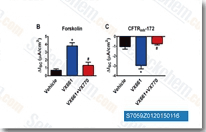
|
| S8851 |
VX-445 (Elexacaftor)
|
Elexacaftor (VX-445) is a next-generation cystic fibrosis transmembrane conductance regulator (CFTR) corrector.This is a compound which is not chiral purity.
|
-
Nucleic Acids Res, 2025, 53(13)gkaf675
-
Mol Ther Nucleic Acids, 2025, 36(4):102756
-
Cell Mol Life Sci, 2025, 82(1):109
|
|
| S6003 |
Ataluren (PTC124)
|
Ataluren (PTC124) selectively induces ribosomal read-through of premature but not normal termination codons, with EC50 of 0.1 μM in HEK293 cells, and may provide treatment for genetic disorders caused by nonsense mutations (e.g. CF caused by CFTR nonsense mutation). This compound is currently in Phase 3.
|
-
Int J Mol Med, 2025, 55(5)69
-
Stem Cell Reports, 2022, 17(10):2187-2202
-
Int J Mol Sci, 2022, 23(7)3541
|
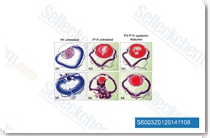
|
| S7139 |
CFTRinh-172
|
CFTRinh-172 (CFTR inhibitor 172) is a voltage-independent, selective CFTR inhibitor with Ki of 300 nM, showing no effects on MDR1, ATP-sensitive K+ channels, or a series of other transporters.
|
-
Mol Ther Nucleic Acids, 2025, 36(4):102756
-
J Cyst Fibros, 2025, S1569-1993(25)01612-1
-
Nat Cancer, 2024, 10.1038/s43018-024-00731-2
|
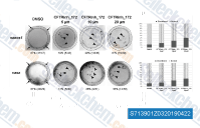
|
| S8698 |
GLPG1837
|
GLPG1837 (ABBV-974) is a novel CFTR potentiator with an EC50 value of 3 nM for F508del, showing enhanced efficacy on CFTR mutants harboring class III mutations compared to Ivacaftor.
|
-
Cell Mol Life Sci, 2024, 81(1):426
-
iScience, 2022, 25(1):103710
-
Int J Mol Sci, 2022, 23(18)10758
|
|
| S8795 |
FDL169
|
FDL169 is a CFTR corrector that is designed to fix and restore the function of the defective CFTR protein.
|
-
Cell Mol Gastroenterol Hepatol, 2021, S2352-345X(21)00158-2
-
J Pers Med, 2021, 11(7)643
-
JCI Insight, 2020, 5(18)139983
|
|
| S8535 |
Galicaftor (ABBV-2222)
|
Galicaftor (ABBV-2222, GLPG2222) is a potent corrector of CFTR for the treatment of Cystic Fibrosis (CF).
|
-
Front Pharmacol, 2024, 15:1494327
-
Biology, 2022, (182)-
-
J Vis Exp, 2022, (182)
|
|
| S7329 |
IOWH032
|
IOWH032 is a synthetic CFTR inhibitor with IC50 of 1.01 μM in CHO-CFTR cell based assays. Phase 2.
|
-
Sci Rep, 2023, 13(1):3934
|
|
| S8094 |
GlyH-101
|
GlyH-101 is a selective and reversible CFTR inhibitor with Ki of 4.3 μM.
|
-
mBio, 2023, 14(5):e0151623
-
mBio, 2023, 14(5):e0151623
-
Cell Mol Immunol, 2020, 10.1038/s41423-020-0499-3
|
|
| S0198 |
PPQ-102
|
PPQ-102 (CFTR Inhibitor IV) is a potent inhibitor of CFTR. This compound can completely inhibit CFTR chloride current with IC50 of ~90 nM.
|
-
Cells, 2023, 12(5)776
|
|
| E1701 |
Vanzacaftor (VX-121)
|
Vanzacaftor(VX-121) is an orally active corrector of Cystic fibrosis transmembrane conductance regulator (CFTR). Vanzacaftor improves the processing and trafficking of CFTR protein and increases chloride transport in combination with Tezacaftor and Deutivacaftor.
|
|
|
| S6911 |
Nesolicaftor (PTI-428)
|
Nesolicaftor (PTI-428) is a specific cystic fibrosis transmembrane conductance regulator (CFTR) amplifier that increases CFTR expression.
|
|
|
| E1743 |
VX-561(CTP-656)
|
VX-561 (CTP-656) is a potent CFTR modulator and exhibits an EC50 value of 255 nM for CFTR potentiation in G551D/F508del HBE cells.
|
|
|
| S6599 |
KM11060
|
KM11060 is a small molecule that corrects the processing of cystic fibrosis transmembrane conductance regulator (CFTR) proteins bearing the F508 deletion (F508del) mutation.
|
|
|
| S9972 |
Icenticaftor (QBW251)
|
Icenticaftor (QBW251, NVP-QBW251) is an oral potentiator of the cystic fibrosis transmembrane conductance regulator (CFTR) channel with EC50 of 79 nM and 497 nM for F508del CFTR and G551D CFTR in Fisher Rat Thyroid (FRT) cells.
|
|
|
| S3272 |
Steviol (Hydroxydehydrostevic acid)
|
Steviol (Hydroxydehydrostevic acid, Hydroxy Dehydrostevic Acid, NSC 226902), a major metabolite of the sweetening compound stevioside, inhibits CFTR activity, reduces AQP2 expression and promotes AQP2 degradation.
|
|
|
| S6003 |
Ataluren (PTC124)
|
Ataluren (PTC124) selectively induces ribosomal read-through of premature but not normal termination codons, with EC50 of 0.1 μM in HEK293 cells, and may provide treatment for genetic disorders caused by nonsense mutations (e.g. CF caused by CFTR nonsense mutation). This compound is currently in Phase 3. |
- Int J Mol Med, 2025, 55(5)69
- Stem Cell Reports, 2022, 17(10):2187-2202
- Int J Mol Sci, 2022, 23(7)3541
|

|
| S7139 |
CFTRinh-172
|
CFTRinh-172 (CFTR inhibitor 172) is a voltage-independent, selective CFTR inhibitor with Ki of 300 nM, showing no effects on MDR1, ATP-sensitive K+ channels, or a series of other transporters. |
- Mol Ther Nucleic Acids, 2025, 36(4):102756
- J Cyst Fibros, 2025, S1569-1993(25)01612-1
- Nat Cancer, 2024, 10.1038/s43018-024-00731-2
|

|
| S7329 |
IOWH032
|
IOWH032 is a synthetic CFTR inhibitor with IC50 of 1.01 μM in CHO-CFTR cell based assays. Phase 2. |
- Sci Rep, 2023, 13(1):3934
|
|
| S8094 |
GlyH-101
|
GlyH-101 is a selective and reversible CFTR inhibitor with Ki of 4.3 μM. |
- mBio, 2023, 14(5):e0151623
- mBio, 2023, 14(5):e0151623
- Cell Mol Immunol, 2020, 10.1038/s41423-020-0499-3
|
|
| S0198 |
PPQ-102
|
PPQ-102 (CFTR Inhibitor IV) is a potent inhibitor of CFTR. This compound can completely inhibit CFTR chloride current with IC50 of ~90 nM. |
- Cells, 2023, 12(5)776
|
|
| S3272 |
Steviol (Hydroxydehydrostevic acid)
|
Steviol (Hydroxydehydrostevic acid, Hydroxy Dehydrostevic Acid, NSC 226902), a major metabolite of the sweetening compound stevioside, inhibits CFTR activity, reduces AQP2 expression and promotes AQP2 degradation. |
|
|
| S1565 |
Lumacaftor (VX-809)
|
Lumacaftor (VX-809, VRT 826809) acts to correct CFTR mutations common in cystic fibrosis by increasing mutant CFTR (F508del-CFTR) maturation, with an EC50 of 0.1 μM in fisher rat thyroid cells. This compound is in Phase 3. |
- Nucleic Acids Res, 2025, 53(13)gkaf675
- Br J Pharmacol, 2025, 10.1111/bph.70176
- iScience, 2025, 28(3):111942
|

|
| S8851 |
VX-445 (Elexacaftor)
|
Elexacaftor (VX-445) is a next-generation cystic fibrosis transmembrane conductance regulator (CFTR) corrector.This is a compound which is not chiral purity. |
- Nucleic Acids Res, 2025, 53(13)gkaf675
- Mol Ther Nucleic Acids, 2025, 36(4):102756
- Cell Mol Life Sci, 2025, 82(1):109
|
|
| S8795 |
FDL169
|
FDL169 is a CFTR corrector that is designed to fix and restore the function of the defective CFTR protein. |
- Cell Mol Gastroenterol Hepatol, 2021, S2352-345X(21)00158-2
- J Pers Med, 2021, 11(7)643
- JCI Insight, 2020, 5(18)139983
|
|
| S8535 |
Galicaftor (ABBV-2222)
|
Galicaftor (ABBV-2222, GLPG2222) is a potent corrector of CFTR for the treatment of Cystic Fibrosis (CF). |
- Front Pharmacol, 2024, 15:1494327
- Biology, 2022, (182)-
- J Vis Exp, 2022, (182)
|
|
| E1743 |
VX-561(CTP-656)
|
VX-561 (CTP-656) is a potent CFTR modulator and exhibits an EC50 value of 255 nM for CFTR potentiation in G551D/F508del HBE cells. |
|
|
| S6599 |
KM11060
|
KM11060 is a small molecule that corrects the processing of cystic fibrosis transmembrane conductance regulator (CFTR) proteins bearing the F508 deletion (F508del) mutation. |
|
|













































